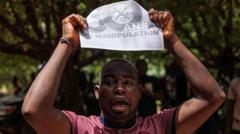In a shocking move, Mali's military junta announced the dissolution of all political parties in the country, a decision which reflects the ongoing repression of dissent following multiple coups in 2020 and 2021. The military leadership, headed by Assimi Goïta, who is expected to remain in charge until at least 2025, issued a decree on state television instructing all political party activities to cease immediately. This decision comes amidst growing calls from political factions for a return to democratic governance.
Mali's Military Junta Dissolves Political Parties Amid Crackdown on Dissent

Mali's Military Junta Dissolves Political Parties Amid Crackdown on Dissent
Mali's military rulers have dissolved all political parties, escalating their crackdown on dissent after seizing power.
The junta's actions have intensified over the past year, marked by a crackdown on political freedoms and expression. Recent events have exacerbated tensions, including the abduction of two opposition leaders after a rare pro-democracy protest. Human rights advocates and political groups have condemned the junta's move and its failure to honor commitments to hold elections by February 2022. A recent national conference organized by the junta, which was boycotted by significant opposition figures, recommended extending Goïta's rule until 2030, drawing widespread condemnation.
The junta's decree warned citizens against disregarding the dissolution and indicated that individuals in political roles could continue their duties without party affiliation. Despite the gravity of the decision, reactions from the opposition have been measured; a member from the leading coalition emphasized resilience and the enduring value of political activism regardless of recognition from the governing authorities.
As Mali distances itself from former colonial ties with France and forges alliances with neighboring military-led governments in Burkina Faso and Niger, this latest development raises concerns about the region's direction and the prospects for democratic restoration.
Critics are increasingly alarmed as the junta pursues its agenda, including withdrawing from the regional body Ecowas, which has been advocating for a return to democracy in the region.
As the situation unfolds, many citizens and political leaders are left grappling with the implications of these authoritarian measures and what it means for Mali's political future.
For more information, visit the BBC Africa news website.
The junta's decree warned citizens against disregarding the dissolution and indicated that individuals in political roles could continue their duties without party affiliation. Despite the gravity of the decision, reactions from the opposition have been measured; a member from the leading coalition emphasized resilience and the enduring value of political activism regardless of recognition from the governing authorities.
As Mali distances itself from former colonial ties with France and forges alliances with neighboring military-led governments in Burkina Faso and Niger, this latest development raises concerns about the region's direction and the prospects for democratic restoration.
Critics are increasingly alarmed as the junta pursues its agenda, including withdrawing from the regional body Ecowas, which has been advocating for a return to democracy in the region.
As the situation unfolds, many citizens and political leaders are left grappling with the implications of these authoritarian measures and what it means for Mali's political future.
For more information, visit the BBC Africa news website.




















